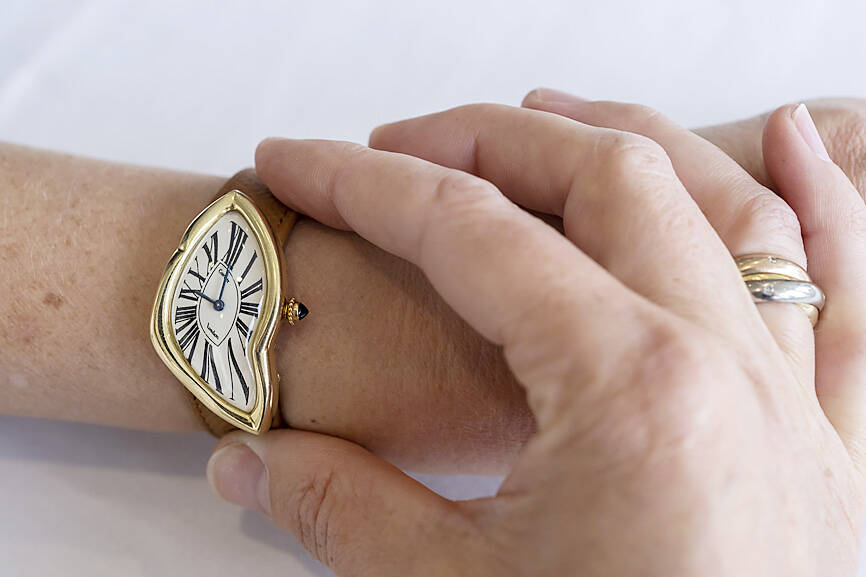Swiss watches are in high demand these days, but sales of secondhand timepieces are also booming, driven by Generation Z buyers who want luxury goods, but are also sustainability-minded.
The global secondhand watch market is estimated at nearly 20 billion Swiss francs (US$21.7 billion) and could reach SF35 billion by 2030, according to a study released in October last year by auditing and consulting firm Deloitte LLP.
Historically, the province of collectors scouting for rare watches at auctions, the secondhand market is turning increasingly professional with the proliferation of online sales sites that verify authenticity — with even the watch manufacturers themselves getting involved.

Photo: EPA-EFE
“Nowadays, there is a realization that we need to consume more responsibly,” said former Foundation of High Horology director Fabienne Lupo, who organized a secondhand luxury watch salon in Geneva, Switzerland, in November.
The event was attended by representatives of online auction giant eBay Inc, watch sales platform Watchbox and Swiss brands such as Zenith.
Lupo said the craze for secondhand watches could be explained by the consumer choices of Millennials (born between 1980 and the late 1990s) and Generation Z (born between 1997 and 2010) who are “very concerned about the future of the planet, and no longer want to buy new.”
There is also the fashion for vintage objects “that you can’t find everywhere,” she said.
Moreover, buying certain Swiss luxury watches new is getting harder, as the booming market means longer waiting lists.
Swiss watch exports hit a new record last year, climbing 11.4 percent year-on-year to SF24.8 billion, the Federation of the Swiss Watch Industry said on Tuesday.
“And then there is the digitalization, which has accelerated with the pandemic,” Lupo said.
The growth in the pre-owned watch market is such that British online platform Subdial has developed an index tracking the 50 most-traded models.
The average price fell from a record SF45,000 in February last year to SF35,000 in September, which Deloitte called a “correction” rather than a sign that the market was shrinking.
Sales platforms for certified preowned (CPO) watches are multiplying online, with the sector still attracting new entrants, including US Web site Bezel, which counts former Walt Disney Co president Michael Ovitz, comedian Kevin Hart and singer John Legend among its investors.
Luxury giant Cie Financiere Richemont SA — which owns the Cartier, IWC and Piaget brands — entered the field as early as 2018, buying British platform Watchfinder.
Rolex SA also took the plunge last month, pulling the rug from beneath the counterfeiters by launching a CPO program with the Swiss retailer Bucherer, which authenticates the watches.
The program is set up in six states, including the UK and France, with the aim of extending it to the US in the future.
“Watch manufacturers typically have been worried about the secondary market as it was closely associated with the gray market, where discounted watches could be found,” said Jon Cox, an industry analyst with the Kepler Cheuvreux financial services company.
“However, they realize there is a halo effect of having strong secondary prices, enhancing the brand value of the primary watches,” he said.

Taiwan Semiconductor Manufacturing Co (TSMC, 台積電) secured a record 70.2 percent share of the global foundry business in the second quarter, up from 67.6 percent the previous quarter, and continued widening its lead over second-placed Samsung Electronics Co, TrendForce Corp (集邦科技) said on Monday. TSMC posted US$30.24 billion in sales in the April-to-June period, up 18.5 percent from the previous quarter, driven by major smartphone customers entering their ramp-up cycle and robust demand for artificial intelligence chips, laptops and PCs, which boosted wafer shipments and average selling prices, TrendForce said in a report. Samsung’s sales also grew in the second quarter, up

On Tuesday, US President Donald Trump weighed in on a pressing national issue: The rebranding of a restaurant chain. Last week, Cracker Barrel, a Tennessee company whose nationwide locations lean heavily on a cozy, old-timey aesthetic — “rocking chairs on the porch, a warm fire in the hearth, peg games on the table” — announced it was updating its logo. Uncle Herschel, the man who once appeared next to the letters with a barrel, was gone. It sparked ire on the right, with Donald Trump Jr leading a charge against the rebranding: “WTF is wrong with Cracker Barrel?!” Later, Trump Sr weighed

HEADWINDS: Upfront investment is unavoidable in the merger, but cost savings would materialize over time, TS Financial Holding Co president Welch Lin said TS Financial Holding Co (台新新光金控) said it would take about two years before the benefits of its merger with Shin Kong Financial Holding Co (新光金控) become evident, as the group prioritizes the consolidation of its major subsidiaries. “The group’s priority is to complete the consolidation of different subsidiaries,” Welch Lin (林維俊), president of the nation’s fourth-largest financial conglomerate by assets, told reporters during its first earnings briefing since the merger took effect on July 24. The asset management units are scheduled to merge in November, followed by life insurance in January next year and securities operations in April, Lin said. Banking integration,

LOOPHOLES: The move is to end a break that was aiding foreign producers without any similar benefit for US manufacturers, the US Department of Commerce said US President Donald Trump’s administration would make it harder for Samsung Electronics Co and SK Hynix Inc to ship critical equipment to their chipmaking operations in China, dealing a potential blow to the companies’ production in the world’s largest semiconductor market. The US Department of Commerce in a notice published on Friday said that it was revoking waivers for Samsung and SK Hynix to use US technologies in their Chinese operations. The companies had been operating in China under regulations that allow them to import chipmaking equipment without applying for a new license each time. The move would revise what is known